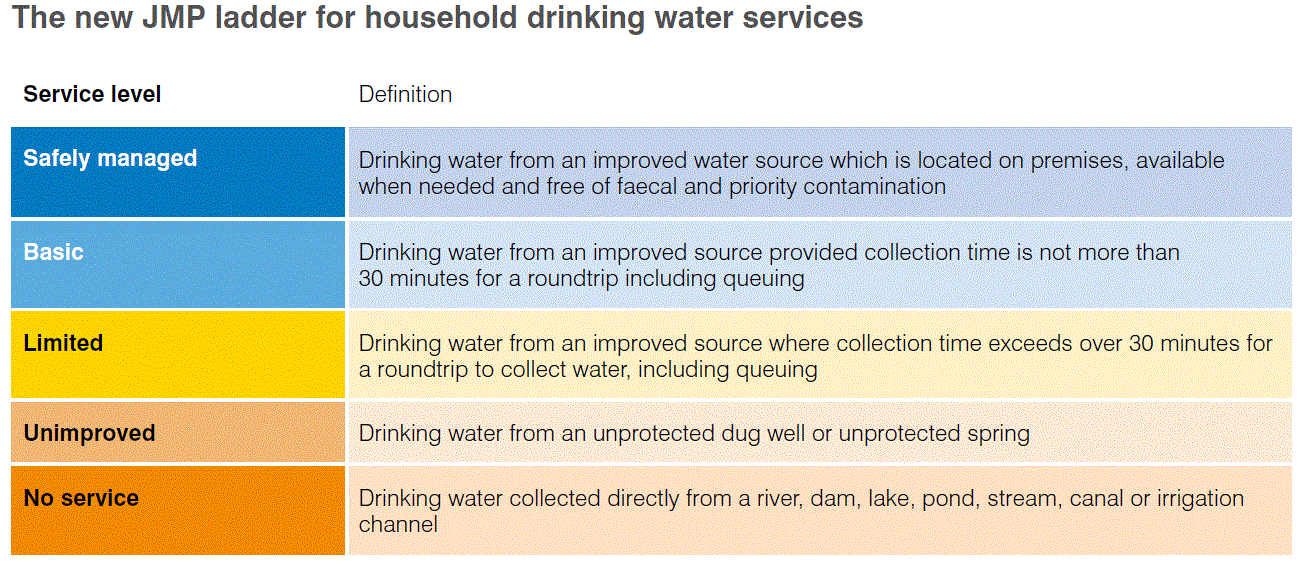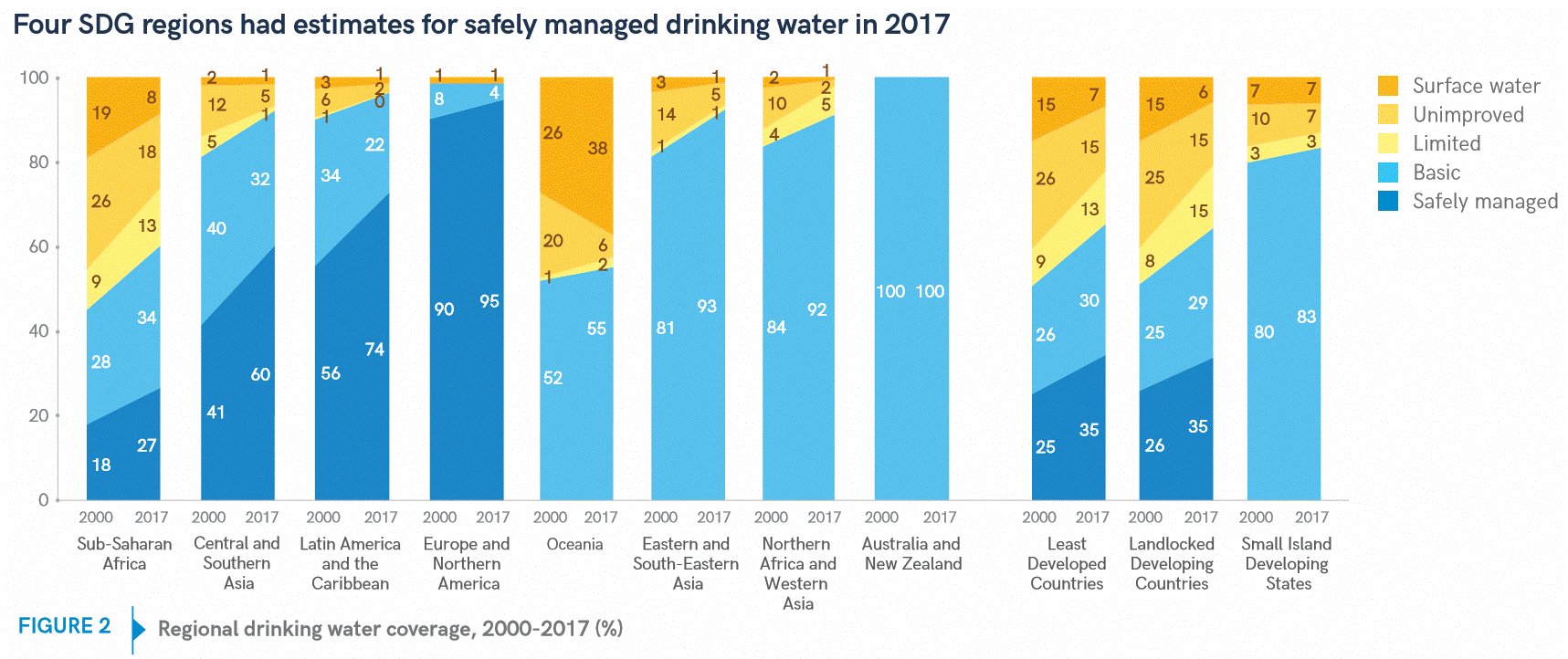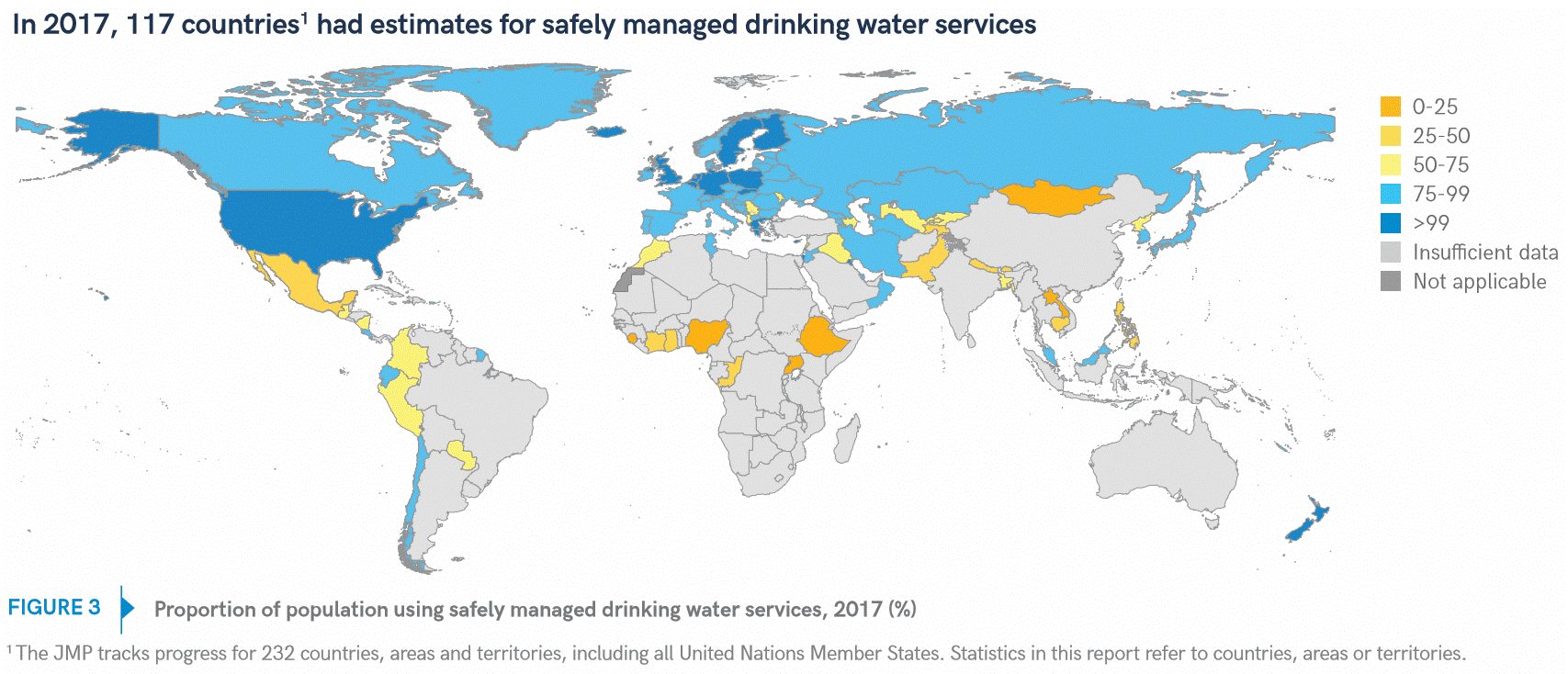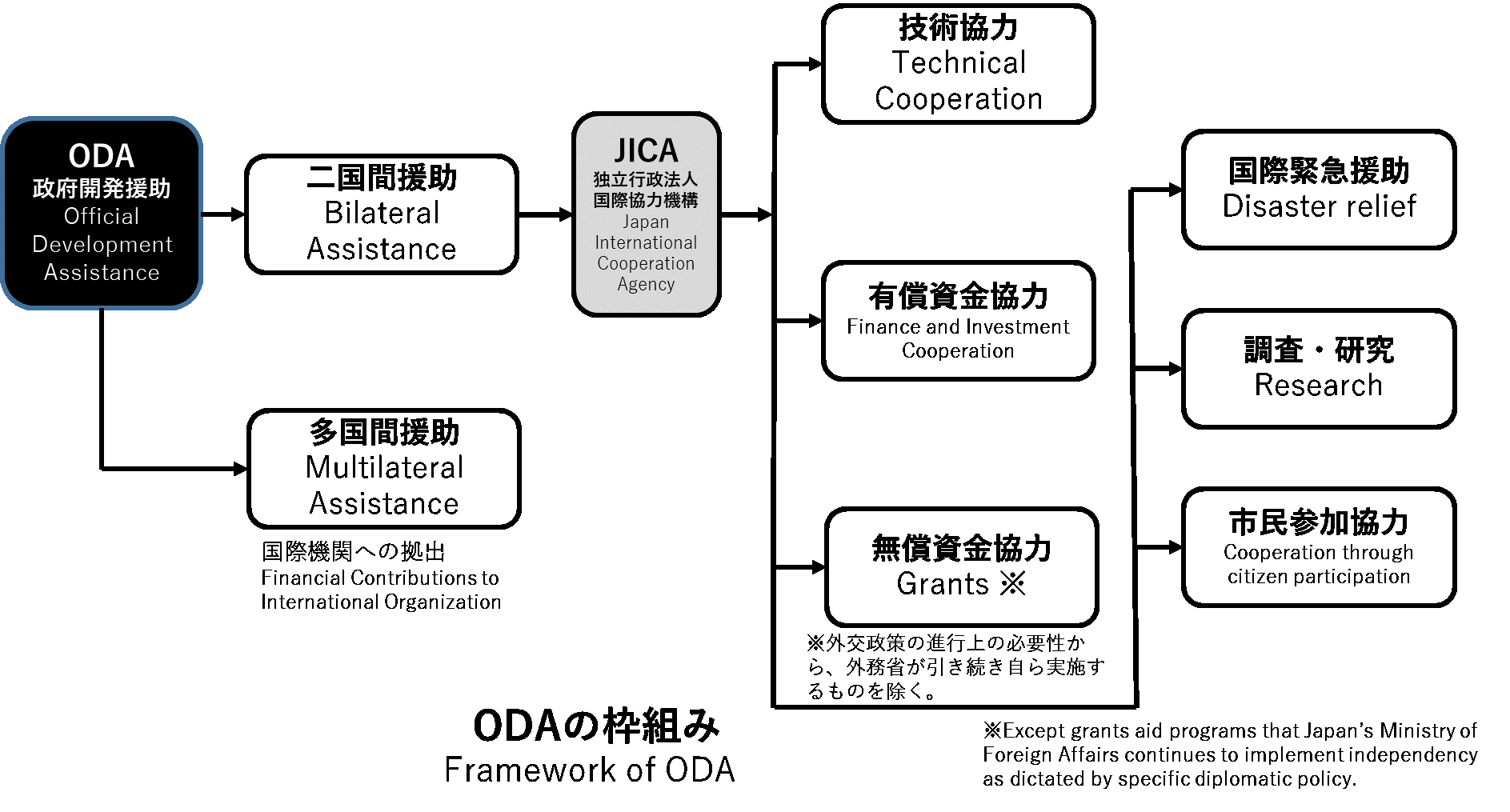◇International Contributions◇
- 0. Preface
- 1. International cooperation in Water Supply sector
- 2. Cooperation with international organizations, bilateral partnerships
- 3. Promotion of the Contributions of Water Supply Industry
- 4. Study of International Cooperation / Project Formation Program in Water Supply Sector
- 5. Links
0. Preface
Water supply is the essential social infrastructure to improve public health and living environment.
In 2015, it is estimated that 663 million people worldwide still use unimproved drinking water sources, including unprotected wells , springs and surface water.
To counter this situation, a new global agenda - the Sustainable Development Goals (SDGs) - was unanimously adopted by the member states of the United Nations in 2015.
The agenda included a dedicated goal on water (SDG6) that aims to “ensure availability and sustainable management of water and sanitation for all in 2030.”
Then, The WHO/UNICEF Joint Monitoring Programme for Water Supply that has been producing regular estimates of global, regional and national progress of drinking water, developed a new service ladder of facilitate enhanced monitoring of drinking water during the SDGs era.
The rungs on the ladder are designed to enable countries at difficult stages of development to benchmark and compare progress over time.

Source: Safely managed drinking – water Thematic report on drinking – water 2017, WHO, UNICEF
As a result of working towards this goal, as of 2017, 117 countries (and four out of SDG regions had estimates for safely managed services, representing 38% of the global population around the world.
5.3 billion people used safely managed services.
An additional 1.4 billion used at least basic services.
206 million people used limited basic services, 435 million used unimproved sources, and 144 million still used surface water.

Source: Progress on household drinking water, sanitation and hygiene 2000 - 2017, WHO, UNICEF
80 countries had >99% basic water coverage.
One in three countries with <99% were on track to achieve nearly universal coverage by 2030.

Source: Progress on household drinking water, sanitation and hygiene 2000 - 2017, WHO, UNICEF
The Ministry of Health, Labor and Welfare has formulated the “New Waterworks Vision,” which shows the immediate efforts for water supply in the future 50 to 100 years from now.
One of the three ideals of this vision, “Sustainable Water Services,” calls for “international expansion” and contributes to achieving the SDGs goals.
1. International cooperation in water supply sector
Japan emphasizes the importance of capacity development, such as the development of the organizations, policies, systems, information and data, and human resources of the governments of developing countries as well as water supply utilities, for proper operation and maintenance and management, under the “Water and sanitation broad partnership initiative (WASABI) (2006),” the Japanese policy of Official Development Assistance (ODA) on water and sanitation sector.
Technical cooperation including the dispatch of technical experts and trainings of staff is the measure to realize the above policy. Among bilateral ODA, the details of technical cooperation, grant aid, and government loan are explained hereafter. Most of the projects on international cooperation in water supply sector are conducted by Japan International Cooperation Agency (JICA).

Source:JICA PROFILE(2019.10)
1) Technical Cooperation
[1] Dispatch of technical experts
To supply safe and high quality water continuously, both water supply facilities appropriate for each natural and social condition and human resources capable of operation and maintenance of their system, are highly important.
MHLW recommends staff of Japanese Water Supply Utilities and related organizations as technical experts to JICA and sends them to developing countries in order to contribute to enhance central and local human capacity for the better management and administration of water supply services.
●The Number of JICA Experts of Water Supply Sector Dispatched by the Recommendation of Ministry of Health, Labour and Welfare
| Fiscal Year | 2010 | 2011 | 2012 | 2013 | 2014 | 2015 | 2016 | 2017 | 2018 | 2019 | 2020 |
| long-term | 5 | 4 | 9 | 7 | 6 | 8 | 6 | 5 | 10 | 9 | 8 |
| short-term | 27 | 30 | 45 | 49 | 29 | 29 | 33 | 35 | 16 | 16 | 0 |
| Sum | 32 | 34 | 54 | 56 | 35 | 37 | 39 | 40 | 26 | 25 | 8 |
Survey by JICA
●Long-term Experts from Water Supply Utilities in FY2020
|
Country |
Project |
Organization |
|
Cambodia |
The Project for Strengthening Administrative Capacity of Urban Water Supply in Cambodia |
Ministry of Health, Labour and Welfare |
|
Cambodia |
The Project for Strengthening Administrative Capacity of Urban Water Supply in Cambodia |
Kitakyushu City |
|
Malawi |
The Project for Strengthening the Capacity of Non-Revenue Water Reduction for Lilongwe Water Board |
Yokohama City |
|
Myanmar |
The Advisor for Water Service Administration and Water Supply in Yangon City |
Fukuoka City |
|
Laos |
The Project for Improvement of Management Capacity of Water Supply Sector (MaWaSU 2) |
Saitama City |
|
Laos |
The Project for Improvement of Management Capacity of Water Supply Sector (MaWaSU 2) |
Kawasaki City |
|
Laos |
The Project for Improvement of Management Capacity of Water Supply Sector (MaWaSU 2) |
Kawasaki City |
|
Timor-Leste |
Water Supply Improvement Advisor |
Chiba Prefecture |
Survey by JICA
●Short-term Experts from Water Supply Utilities in FY2020
None
Survey by JICA
●Survey Members from Water Supply Utilities in FY2020
None
Survey by JICA
●Technical Cooperation Project (Starting in FY2020)
|
Country |
Project |
Period |
|
Pakistan |
The Project for Improving the Capacity of WASAs in Punjab Province Phase 2 |
February,2011-February,2024 |
Survey by JICA
[2] Training staff in the water supply sector
ODA supports self-help efforts of developing countries. Further, the contributions of human resource development help strengthen friendship between Japan and those countries.
MHLW cooperates with JICA for group training programs and individual training programs on water supply sector, together with water supply utilities and related organizations.
●The Number of Participants in Training Courses on Water Supply Sector
| Fiscal Year | 2010 | 2011 | 2012 | 2013 | 2014 | 2015 | 2016 | 2017 | 2018 | 2019 | 2020 |
| JICA Group Training | 76 | 69 | 65 | 81 | 100 | 136 | 132 | 144 | 83 | 113 | 31 |
| JICA Country-Focused Training | 100 | 121 | 115 | 89 | 52 | 26 | 61 | 38 | 21 | 84 | 13 |
| Sum | 176 | 190 | 180 | 170 | 152 | 162 | 193 | 182 | 104 | 197 | 44 |
Survey by JICA
●Details of JICA Group and Country-Focused Training Programs Accepted by Water Supply Utilities in FY2020
|
Type |
Country |
Course |
Organization |
Participants |
|
Group Training |
African Region Urban Waterworks Engineering |
Yokohama Water Co., Ltd |
7 |
|
|
Comprehensive Engineering on Water Supply System(A) |
Japan Water Works Association |
3 |
||
|
Water Supply Administration for Better Management of Water Supply Services (A) |
Japan International Coprporation of Welfare Services |
21 |
||
|
Country-Focused Training |
Malawi |
The Project for Strengthening the Capacity of Non-Revenue Water Reduction for Lilongwe Water Board |
Yokohama City |
10 |
|
Cambodia |
The Project for Strengthening Administrative Capacity of Urban Water Supply in Cambodia |
Japan Water Works Association |
1 |
|
|
Laos |
The Project for Improvement of Management Capacity of Water Supply Sector (MaWaSU 2) |
Japan Water Works Association |
1 |
|
|
Kanya |
The Project for strengthening capacity in Non-Revenue water reduction |
Yokohama Water Co., Ltd |
1 |
|
Survey by JICA
[3] Development Study
In development study, the validity of projects is examined. The analogy of the continuation of the Japanese water business is like a survey conducted when applying for a water business license. After the judgment of validity of projects based on the results of the study, projects are initiated with planning of water supply.
●Development Study, etc.(Starting in FY2020)
None
Survey by JICA
2) Grant Aid
●Grant Aid on Water Supply Sector
| Fiscal Year | 2010 | 2011 | 2012 | 2013 | 2014 | 2015 | 2016 | 2017 | 2018 | 2019 | 2020 |
| Number | 18 | 14 | 11 | 14 | 9 | 10 | 2 | 6 | 4 | 4 | 13 |
| Amount (Million Yen) | 21,796 | 15,773 | 10,500 | 19,054 | 11,387 | 18,861 | 7,964 | 9,435 | 11,551 | 9,218 | 16,951 |
Survey by JICA
●Grant Aid Projects in FY2020
|
Country |
Project |
Amount (Million Yen) |
|
Pakistan |
The Project for the Improvement of Water Treatment Plant and Water Distribution System in Faisalabad |
4,094 |
|
Bangladesh |
The Project for the Improvement of the Water Supply and Distribution System for Host Communities and Displaced Persons from Myanmar in Teknaf Upazila, Cox’s Bazar District |
986 |
|
Jordan |
The Project for Improvement of the Zai Water Supply System |
2379 |
|
Ethiopia |
The Project for Improvement of Water Supply in Bahir Dar City |
236 |
|
Gambia |
The Project for Rural Water Supply (Phase 4) |
1591 |
|
Sudan |
The Project for Improvement of Water Treatment Plant in Kosti City |
241 |
|
Sudan |
The Project for Improvement of Operation and Maintenance of Water Supply System |
1004 |
|
Benin |
The Project for the Reinforcement of Drinking Water Supply System in Couffo and Plateau Department (Detailed Design) |
129 |
|
South Sudan |
The Project for the Improvement of Water Supply System of Juba in South Sudan |
636 |
|
Mozambique |
The Project on Promoting Sustainability in Rural Water Supply, Hygiene and Sanitation in Niassa Province in the Republic of Mozambique |
2076 |
|
Marshall Islands |
The Project for the Improvement of Water Reservoir at Majuro Atoll |
1757 |
|
Syria |
The Project for Strengthening Access to WASH, Maternal and Child Health Services in East Ghouta (through UNICEF) |
489 |
|
Afghanistan |
The Project for Improving WASH Environment in Schools |
422 |
|
sum |
16951 |
Survey by JICA
3) Finance and Investment Cooperation
Finance and Investment Cooperation, yen loan, is the funds loaned under moderate conditions for interest, repayment period, and others, through the Japan International Cooperation Agency (JICA), to contribute to the economic and social development of developing regions and economic stability.
●Finance and Investment Cooperation on Water Supply Sector
| Fiscal Year | 2010 | 2011 | 2012 | 2013 | 2014 | 2015 | 2016 | 2017 | 2018 | 2019 | 2020 |
| Number | 0 | 6 | 5 | 3 | 1 | 3 | 3 | 4 | 2 | 1 | 2 |
| Amount (Million Yen) | 0 | 83,218 | 88,291 | 42,442 | 23,683 | 70,181 | 75,600 | 143,486 | 21,878 | 38,642 | 54,946 |
Survey by JICA
●Finance and Investment Cooperation Projects on Water Supply Sector in FY2020
|
Country |
Project |
Amount (Million Yen) |
|
India |
Rajasthan Rural Water Supply and Fluorosis Mitigation Project (Phase 2) |
45816 |
|
Paraguay |
Project for Water and Sanitation for the Metropolitan Area of Ciudad del Este |
9130 |
|
sum |
54946 |
Survey by JICA
2. Cooperation with international organizations, bilateral partnerships
MHLW establishes a strong international network with international organizations and provides knowledge and information to other countries through organizations such as World Health Organization and International Water Association.
1) Partnership with WHO, etc.
●Revision of WHO Guidelines for Drinking-water Quality
・Investigation toward the revision WHO Guidelines for Drinking-water Quality
・Financial contributions to the activities of WHO
・Dispatch of technical experts to technical committees
※WHO Guidelines for Drinking-water Quality
The guidelines for Drinking-water Quality are expected to be referred when each country defines the drinking water quality standards.
In the guidelines, guideline value is set for each potential hazardous chemical such as carcinogens, with a general assumption that a daily per capita consumption is 2 liters by a person weighing 60kg for 70 years (lifetime).
●O&M Network
・Financial contributions to the activities
・Dispatch of technical experts
※O&M (Operation and Maintenance) Network
The Operation and Maintenance Network (OMN) aims to improve information and expertise exchange on the critical subject of operation and maintenance of water supply and sanitation systems under IWA (International Water Association) in cooperation with WHO. Related training tools are developed, and seminars are organized. The coordinator of Operation and Maintenance Network is Department of Water Supply Engineering, National Institute of Public Health, Japan.
●RegNet (Regulators’Network)
・Dispatch of staff to meetings
・Cooperation for the development of guidance
※RegNet
The International Network of Drinking-Water Regulators (RegNet) established under WHO aims to promote best practice to developing countries, in order to regulate a variety of water quality and water management issues.
2) Contributions to the Activities of ISO/TC224
●ISO/TC224
・Support for international standardization related to water supply and domestic measures (Dispatch of members to working groups for the revision of the standards in 2011.)
※ISO/TC224:International Standards of Service Activities Relating to Drinking Water Supply and Sewerage
TC:Technical Committee
3) Bilateral Meetings
●Japan-Korea water supply administration meetings
●Japan-U.S. Governmental Conference on Drinking Water Quality Management and Wastewater Control
4) Emergency Restoration Support
●Restoration support for the earthquake in Sichuan, China
Water supply utilities and private companies provided materials for emergency water supply, bottled potable water, etc. responding to the request from related organizations, when the earthquake in Sichuan, China occurred in May, 2008.
●Dispatch of Japan Disaster Relief Expert Team in response to the Flood Disaster in Thailand
Thailand has experienced a flood in Oct, 2011. The country sought support for the O&M of waterworks during the flood. In light of this situation, the expert team was dispatched.
3. Promotion of the Contributions of Water Supply Industry
In addition to ODA, the contributions of the Japanese water supply industry are necessary for safe drinking water supply in developing countries. MHLW conducts a study to support these contributions by utilizing Japanese know-how stored in both public and private sector, while establishing reliable water supply systems in Asian countries. MHLW has organized seminars and field surveys in China, Cambodia and Viet Nam.
1) Summary
●Project period:FY2008 – FY2012 (5 years)
●Contents:Promotion of partnership with Asian countries, case studies for international contributions of Japan water supply industry, etc.
2) Reports
●FY2010
・The Second Vietnam – Japan Water Works Seminar -outline- (PDF:91KB)
4. Study of International Cooperation / Project Formation Program in Water Supply Sector
1) Study of International Cooperation in Water Supply Sector
The study to analyze the current situation of developing countries and need for international cooperation is being conducted to find the best way of international cooperation together with the Japanese government, water supply utilities, and private companies.
2) Project Formation Program in Water Supply Sector
MHLW conducts project formation program to improve the capacity of project formation of developing countries. This program technically reviews a potential program or plan in developing countries, provides appropriate guidance and advice, and transfers the technical expertise of Japan, in order for those countries to become able to form a carefully designed good project.
5. Links
Water Supply in Japan
International Cooperation
Information about the Great East Japan Earthquake
